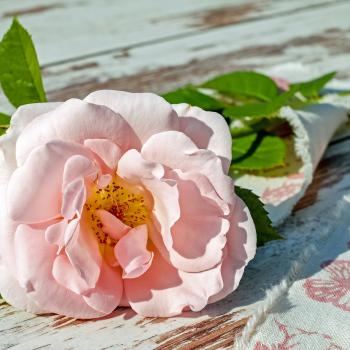So with her father’s blessing light upon her, she rode away beside the prince; and ever after, all her life was crowned with happiness as it had been written for her in the stars.
In part I of this series I offered some background to Annie Fellows Johnston’s 1904 short story The Three Weavers, and in part II the story began as three weavers—Herthold, Hubert, and Hildgardmar—who live side-by-side and have similar fortunes, bore three infant daughters—Hertha, Huberta, and Hildegard. At each girl’s christening, a fairy appeared and declared that the girl would marry a prince—if she could weave him a royal mantle.
In part III the three fathers took very different courses of action in introducing the magic looms and weaving—here an analogy for love and sex—to their daughters. Hertha shamed his daughter for asking about her loom, and she is now weaving in secret. Huberta’s father gave her her loom with a laugh, and told her to have fun with it however she pleased. Hildegarde’s father spoke seriously with her about her loom, giving it to her along with a silver yardstick and careful instructions. And now we pick up as the seasons pass.
After that the winter followed the autumn and the summer the spring many times, and the children played in the garden and learned their lessons of broidery and fair needlework and songs upon the lute. And every day each stole away to the inner room, and threw the shuttle in and out among the threads of gold.
Hertha worked always in secret, peering ever in the mirror, lest perchance the long-haired page in crimson clad should slip by and she not see him. For the sheen of his fair hair dazzled her to all other sights, and his face was all she thought of by day and dreamed of by night, so that she often forgot to ply her needle or finger her lute. He was only a page, but she called him prince in her thoughts until she really believed him one. When she worked at the web she sang to herself, ‘It is for him—for him!’
Huberta laughed openly about her web, and her father often teased her about the one for whom it was intended, saying, when the village lads went by, ‘Is that thy prince?’ or, ‘Is it for this one thou weavest?’ But he never went with her into that inner room, so he never knew whether the weaving was done well or ill. And he never knew that she cut the web of one year’s weaving and gave it to the curly shepherd lad. He wore it with jaunty grace at first, and Huberta spent long hours at the mirror, watching to see him pass by all wrapped within its folds. But it grew tarnished after awhile from his long tramps over the dirty moors after his flocks, and Huberta saw other figures in the mirror which pleased her fancy, and she began another web. And that she gave to a student in cap and gown, and the next to a troubadour strolling past her window, and the next to a knight in armour who rode by one idle summer day.
The years went by, she scattering her favours to whomsoever called her sweetheart with vows of devotion, and Hertha faithful to the page alone. Hildegarde worked on, true to her promise. But there came a time when a face shone across her mirror so noble and fair that she started back in a flutter.
‘Oh, surely ’tis he,’ she whispered to her father. ‘His eyes are so blue they fill all my dreams.’ But old Hildgardmar answered her, ‘Does he measure up to the standard set by the sterling yardstick for a full-grown prince to be?’
‘No,’ she answered, sadly. ‘Only to the measure of an ordinary man. But see how perfectly the mantle I have woven would fit him!’
‘Nay, weave on, then,’ he said, kindly. ‘Thou hast not yet reached the best thou canst do. This is not the one written for thee in the stars.’
A long time after a knight flashed across the mirror blue. A knight like Sir Lancelot:
His broad clear brow in sunlight glowed.
On burnished hooves his war-horse trode.
From underneath his helmet flowed,
His coal-black curls, as on he rode
As he rode down to Camelot.”So noble he was that she felt sure that he was the one destined to wear her mantle, and she went to her father, saying, ‘He has asked for the robe, and measured by thy own sterling yardstick, it would fit him in faultlessness, as the falcon’s feathers fit the falcon.’
Hildgardmar laid the yardstick against the web. ‘Nay,’ he said. ‘This is only the size of a knight. It lacks a handbreadth yet of the measure of a prince.’
Hildegarde hesitated, half-pouting, till he said, beseechingly, ‘I am an old man, knowing far more of the world and its ways than thou, my daughter. Have I ever deceived thee? Have I ever had aught but thy good at heart? Have patience a little longer. Another year and thou wilt be able to fashion a still larger web.’
You can see why this story might become popular as a patriocentric culture like the patriarchal wing of the Christian homeschooling movement. The entire plot revolves around Hildgardmar giving his daughter a silver yardstick to measure her future husband, and then making sure she doesn’t stray from that measure. Hildegarde comes to her father every time she sees someone she thinks might be her prince, and he carefully remeasures with the yardstick and tells her that she’s wrong, and that she must tear her glance away from the man she was considering. Coming from a patriarchal courtship background like I do, this is all very, very familiar.
And so I have to ask. First, how does Hildegarde’s father know conclusively which man is the right man for her? And second, what would be so wrong with Hildegarde choosing to marry an ordinary man or a knight rather than the prince her father has in mind for her? Like the fathers of many a girl crowing up in the Christian Patriarchy movement, Hildegarde’s father is micromanaging her love life as though he, and he alone, knows what is best for her, and as though she is on her own too immature and besmitten to every be trusted to choose for herself.
Notice how Hildegarde’s father draws on his age as to convince her to follow his instructions—he is, after all, older and wiser an “knows far more of the world.” This is very similar to the “umbrella” analogy so often invoked in patriarchal homeschool circles—this idea that it is the father’s job to shield and protect his daughter from the world by making her decisions for her, or at the very least vetting her decisions with the power of veto. The thing is, at some point young people need to be allowed to make their own decisions, and if they make bad decisions they will learn from those decisions. After all, what if Hildegarde were to go on following her father’s advice on everything and never learning how to make her own judgments and her own decisions, and then her father were to die, leaving her alone? Children should be equipped with the judgment and ability to make their own decisions, and then set free. Doing otherwise threatens to cripple them.
And before I draw the curtain here, I want to point out how very clear this section makes it that the mantles are meant to stand in for romantic favors and sex. Hertha, after all, is going around giving out mantles every which way. And apparently, sexual favors are things that can end up becoming “tarnished.” You know, just in case anyone had any doubt what kind of story this was.
For the end of the story, see Part V.









